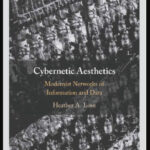These modernists aim to cultivate in readers the capacity to “think cybernetically”—that is, to develop strategies for responding in creative and generative ways to the 20th century’s complex sociocultural (and socio-technical) environment.



These modernists aim to cultivate in readers the capacity to “think cybernetically”—that is, to develop strategies for responding in creative and generative ways to the 20th century’s complex sociocultural (and socio-technical) environment.

We need our brains to adapt advantageously for ingenious design and development, especially as the time between stimulus and response becomes precariously pressurized.

A new archive of material added a new historical dimension to our discussions of cybernetics at the 2016 Norbert Wiener Conference in Australia.

Arthur Winston addressed to attendees of the 2016 IEEE Conference on Norbert Wiener in the 21st Century, Melbourne, Australia, held… Read More

Graeme Clark is the inventor of the cochlear implant. He was the dinner Keynote Speaker at the 2016 Conference on… Read More

Norbert Wiener and the Call for Ethical Engagement Over the last century, the greatest acceleration of technological development has come… Read More

Heather M. Roff and Peter W. Singer [1] strikingly identify a problem for the next American president in the form… Read More

The arc of Norbert Wiener’s fascinating life became clear to us one day in the M.I.T. Institute Archives. In one… Read More

The postwar period was one of intense interdisciplinary ferment, nowhere more so than at the famous Macy conferences on circular… Read More

My childhood memories of Norbert Wiener are of a strange looking person who came repeatedly from his New Hampshire home… Read More

Mary Catherine Bateson in an interview from the 2014 Norbert Wiener Conference in Boston. In the early part of… Read More

The Uneasy History of the Soviet Internet. By Benjamin Peters. M.I.T. Press, 2016, 312 pages. Reviewed by Loren Graham. … Read More

The Cybernetics Moment, Or Why We Call Our Age the Information Age. By Ronald R. Kline. Johns Hopkins University Press,… Read More